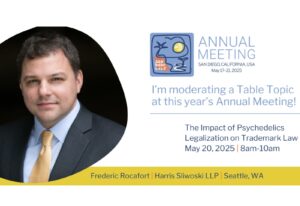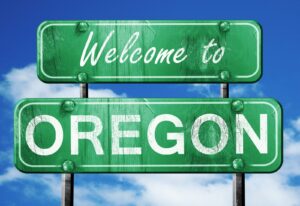Perhaps inevitably, lawmakers introduced a very skinny bill last week to protect states that legalize psilocybin from federal intervention. Specifically, it requires that:
[n]o Federal funds may be used to prevent any State or unit of local government from implementing such State’s or unit of local government’s own laws that authorize the use, distribution, sale, possession, research or cultivation of psilocybin.
So it’s a spending bill prohibition, like the Rohrabacher-Blumenauer amendment for medical cannabis. And Earl Blumenauer (D-OR) is in fact sponsoring this new law, along with Robert Garcia (D-CA). That’s it for now, though we expect the bill to pick up some support in the coming weeks and months.
This new psilocybin safe harbor bill is embarrassingly named the “VISIONS Act of 2023.” The “VISIONS” expansion is: Validating Independence for State Initiatives on Organic Natural Substances. We do like that part. Below are some other things I like and don’t like about the bill.
The VISIONS Act gives states a safe harbor on psilocybin, only
It seems shortsighted that the bill is drawn so narrowly, when other “organic natural substances” are already coming online through state initiatives, including substances of the psychedelic variety. Yes, I’m talking about Colorado’s Proposition 122. In addition to psilocybin, Proposition 122 allows Colorado to license the sale of dimethyltryptamine (DMT), ibogaine and mescaline by 2026. Protection for those substances wouldn’t be covered under the VISIONS Act as submitted.
You get into broader questions here too. The federal government has been half-in and half-out on other “organic natural substances” over the years. Kratom is a great example of this. Many states’ laws “authorize the use, distribution, sale, possession, [etc.]” of kratom. Unlike psilocybin, kratom isn’t scheduled on the federal Controlled Substances Act. It is, however, identified by the Drug Enforcement Administration as a “drug of concern”; and we’ve seen U.S. marshals seize large shipments of kratom, including very recently.
In all, the VISIONS Act is probably drawn too narrowly by covering only psilocybin, and by focusing only on substances legalized through “state initiatives.”
The VISIONS Act is appropriations legislation
This is good and bad. Pushing a bill like the VISIONS Act through as a spending rider is easier than rallying Congress to de- or reschedule a substance. Just ask the cannabis folks. That said, appropriations legislation must be renewed annually. This means the VISIONS Act could move through one year, only to be cut the year following. Another issue is that Congress consistently struggles to pass spending bills on time. Medical cannabis people used to fret during such intervals that the feds could swoop in and enforce their terrible laws. Those fears were overstated, but still.
On the other hand, you could argue that introducing the VISIONS Act as spending legislation is probably the best way to posture it. Under U.S. v. McIntosh, we have good precedent upholding the power of Congress to restrain the U.S. Department of Justice (DOJ) from interfering with state programs as to Schedule I controlled substances (cannabis, in that case). It’s also arguably better than a “Cole Memo for psilocybin”, in that the VISIONS Act would be a law, however “sticky”, and not a policy. That said, some colleagues whom I respect a good deal would also like to see a tolerance memo.
The VISIONS Act would help with “crack house statute” concerns
The CSA at 21 USC § 856 is often referred to, grossly, as “the crack house statute.” This law provides that it is unlawful to:
knowingly open, lease, rent, use, or maintain any place, whether permanently or temporarily, for the purpose of manufacturing, distributing, or using any controlled substance; [and to]
manage or control any place, whether permanently or temporarily, either as an owner, lessee, agent, employee, occupant, or mortgagee, and knowingly and intentionally rent, lease, profit from, or make available for use, with or without compensation, the place for the purpose of unlawfully manufacturing, storing, distributing, or using a controlled substance.
In other words, federal law prohibits people from doing exactly what they’re doing in the Oregon psilocybin program. And what they will soon be doing in Colorado and elsewhere.
The crack house statute was recently at issue in the context of safe injection sites, in some high-visibility litigation with the federal government. In short, the Third Circuit held that facilitating a supervised injection site is unlawful, even if you’re not providing the drugs. Per this reading of the CSA, the feds could certainly come after any state-sanctioned psilocybin program participants, absent prophylactic legislation such as the VISIONS Act.
Conclusion
The impetus behind the VISIONS Act is the following, fundamental question: will federal law enforcement step in? A related question might be: how can Congress best respect the democratic experiment of state-sanctioned psychedelics programs?
I previously explained that the Oregon Health Authority (OHA) was scheduled to contact local U.S. Attorneys last year, to facilitate a conversation on this very topic. OHA informs me that they did, in fact, reach out, but the response was subdued– essentially just confirmation from DOJ that it is aware of the state’s psilocybin program. No developments since then.
Today, Oregon’s program is well underway and Colorado’s is coming fast. We don’t have federal protections or guidance– just this skinny little bill. And that will have to be enough.

























